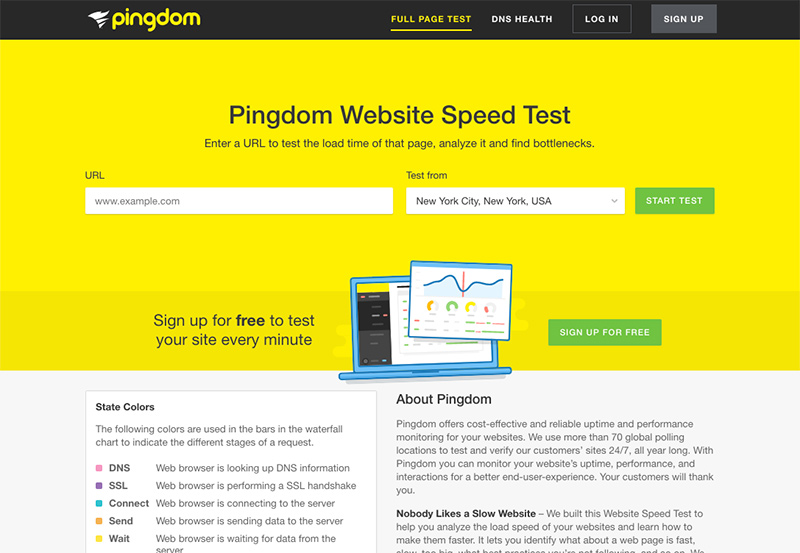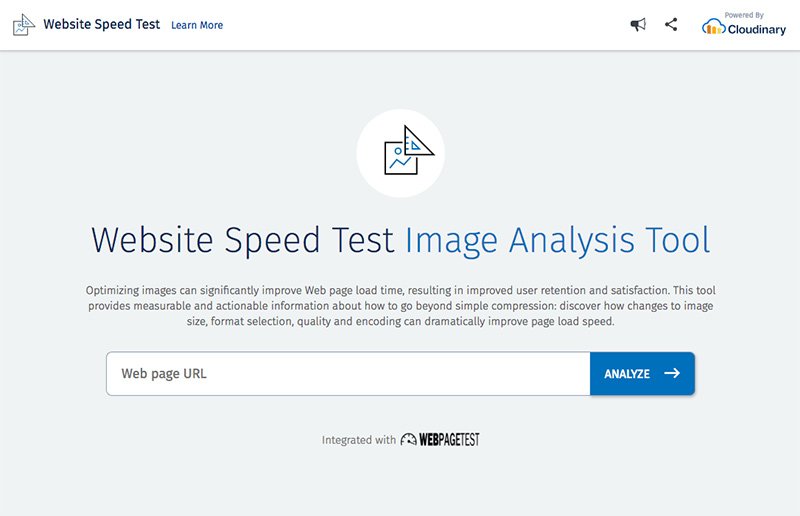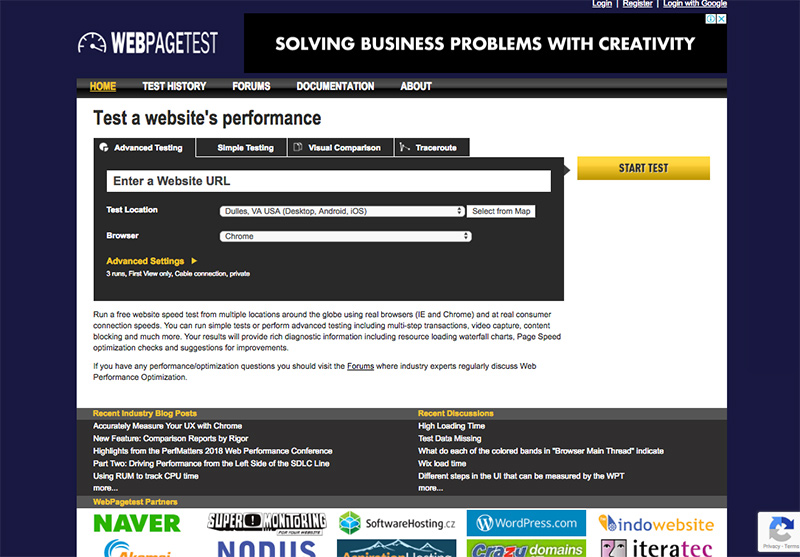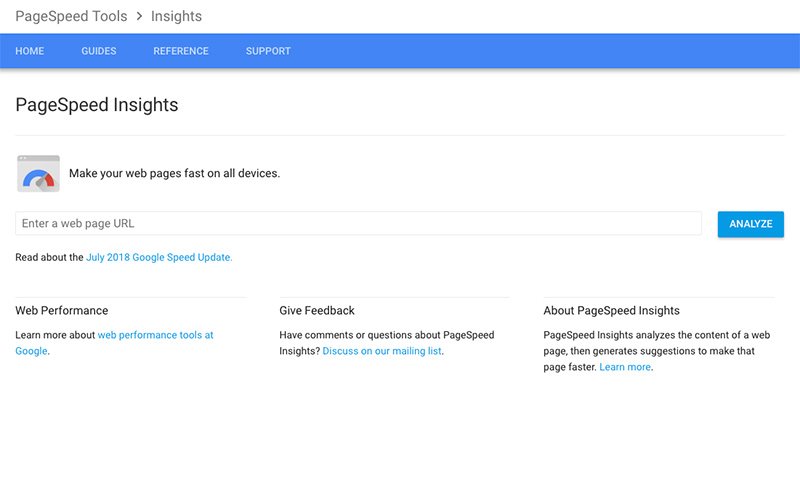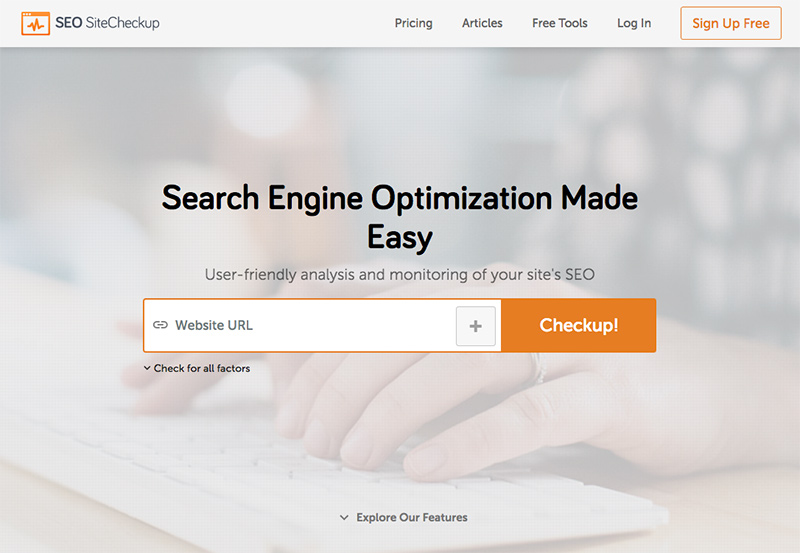Page speed affects your performance in almost every area, from user experience to SEO. In fact, most web users will only wait about four seconds for the page to load and then move to something else. And, in the case of a faster site that will behave better, and not be resolved.
But it can be difficult to know where to start. Sitting on your computer with a stopwatch as your site loads is not a great way to determine whether your site is fast enough.
That's why most developers and marketers will use a variety of free website Speed test controls. These tools are always constantly changing and updating.
Therefore, 2018 years ago 10 free website Speed test control will include some new collections!
1. GTmetrix
Among the premier free website speed test tools of 2018 is GTmetrix. This tester is incredibly straightforward. You just put your URL in and hit “Analyze.” GTmetrix’s strengths include:
- The overall interface is incredibly easy to use. It’s UX design is easy to navigate and elicits trust.
- Page speed numbers are given to you with context (your fully loaded time is compared to the overall internet average of 6.7 seconds, for example). Sometimes it’s nice to know how you’re doing relative to the rest of the internet!
- Scores are broken down by type, meaning if you aren’t overly familiar with web development, you can still determine whether issues are primarily coming from your CSS, Javascript (learn about minifying your CSS and JavaScript files here), or server environment, for example.
Verdict: GTMetrix does offer a Pro level upgrade that grants access to page settings, monitoring, and alerts, among other benefits. But the test itself is free and you can easily download the data. GTmetrix is also very user-friendly, making it one of the best page speed tools of 2018.
2. Pingdom
For the most part, Pingdom provides users with a nice mix of options and simplicity. As such, Pingdom offers the following benefits:
- In its current configuration, Pingdom lets users test their webpage speed from any of four different testing locations. In general, you’re going to want to choose the testing location closest to your website’s geographic user base.
- Results are incredibly easy to read, with letter grade breakdown of performance insights that also provide a specific list of issues to address.
- The waterfall is also one of the easier to read among webpage speed testing tools, and the data is broken down in a way that makes it easier to dig deeper.
Verdict: Pingdom is a deceptively deep webpage speed tester. Its interface is simple and easy to use. The data generated is well-organized and easy to skim or dive deep into the details. Pingdom is a great tool to provide a client facing report while also giving your developer information specific enough to address problems.
3. Website Speed Test (Image Analysis Tool)
Modern websites are image-heavy. And with so many people using high definition displays and retina screens, it’s really difficult to get away with low-resolution pictures. That’s why image compression has become ubiquitous. And to test those images, I recommend the Website Speed Test Image Analysis Tool, powered by Cloudinary. This tool:
- Gives you a readout of each and every image on the analyzed page. This readout tells you how large the image is and how much space you could save by compressing it in a different way.
- Provides data on how many images your webpage successfully loads – and how much overall data they require.
- Provides suggestions on ways to further compress your images without sacrificing image quality.
Verdict: The Website Speed Test Image Analysis Tool is one of the only tools to focus entirely on images. With a more visual web coming our way in the future, this tester is an essential tool to have in your kit.
4. WebPageTest
Our next entry on the list probably isn’t going to win any web design awards in the near future. WebPageTest, however, is one of the more reliable and trusted website speed testing tools available to users today. The primary strengths of WebPageTest include:
- Users can create custom settings for each run of WebPageTest they initiate.
- With all of these options, WebPageTest can be configured to use a wide variety of different locations and different web browser options. It’s possible your website might be slow on Google Chrome but lighting quick on Firefox, and if that’s the case, WebPageTest will let you know.
- Users can also order WebPageTest to perform multiple runs. This can give you a sense as to whether your website’s page speed is performing consistently.
Verdict: WebPageTest is both open source and free. That means it’s not flashy, and the results and diagnostics aren’t very user-friendly. But the data is accurate. And if you know what you’re doing, WebPageTest can give you a wealth of information to consider.
5. Google PageSpeed Insights
Compared to the other 9 entries on this list, Google PageSpeed Insights isn’t going to provide a lot of data or suggestions on how to fix problems. In fact, it’s not really a true page speed testing tool. But there are some reasons why it’s still worth checking out this Google-built tool:
- Google’s results might matter more than other tools’ results. That’s because Google actually creates the search rankings where you’re trying to gain traction. If a Google tool is finding issue with your website performance, it’s a good idea to take that data seriously.
- This tool is also incredibly easy to use. Just type your web address in, wait a few seconds, and you’ll see results from both mobile and desktop versions of your website. All the results are color-coded nicely, so you tend to know pretty instantly whether your website is performing well or not.
Verdict: If it weren’t the official Google tool, PageSpeed Insights might not be on this list. It just doesn’t have all the features that the other tools on our list have. But you definitely want to check on how Google evaluates your page speed if you want to rank highly on their search platform. In this case, the authority of the tool eclipses its utility.
6. SEO Site Checkup
I mentioned before that page speed is an incredibly important factor in how Google ranks your website. SEO Site Checkup is a great tool that lets you address page speed at the same time you’re looking into other search engine optimization factors. I like SEO Site Checkup because:
- SEO Site Checkup takes a holistic approach to your website’s health, looking at factors that can impact performance as well as user experience and search rankings.
- The report SEO Site Checkup provides is easy to read and, more importantly, easy to act on. The tool will point you towards easy to fix issues that you might have missed.
- The comprehensive approach can help you see just how important your page’s speed can be to the overall performance of a website, both with users and with search engine algorithms.
2018 Verdict: SEO Site Checkup is a vital tool for any web marketing professional. After running this diagnostic, you’ll be better able to determine where to commit resources and time to best improve your webpage performance


